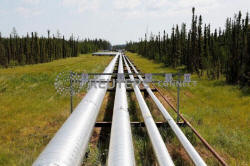Canada's cash-rich oil sands firms face pressure to
spend on transition
 Send a link to a friend
Send a link to a friend
 [April 01, 2021] By
Rod Nickel, Nichola Saminather and Nia Williams [April 01, 2021] By
Rod Nickel, Nichola Saminather and Nia Williams
(Reuters) - Canada's biggest oil sands
producers are generating billions more in free cash flow in a
faster-than-expected pandemic rebound, but taking a cautious approach to
spending it that is disappointing environment-minded investors.
Their strategy to repay debts and pay shareholders has won praise from
investors in Canadian Natural Resources, Suncor Energy and Cenovus
Energy who are eager for higher returns. But greener shareholders warn
they could divest or oppose management.
The sharp recovery has thrust the companies deep into a debate on
returns versus cleaner fuels that will determine the makeup of their
business for decades. The oil and gas sector accounted for 26% of
Canada's carbon emissions in 2018, and Prime Minister Justin Trudeau has
set a goal of net-zero emissions for the country by 2050.
Canadian Natural expects to generate up to C$5.4 billion ($4.30 billion)
in free cash flow in 2021, from C$692 million last year. Suncor projects
additional cash flow of C$400 million this year and C$1 billion by 2023.
Cenovus could generate C$3.5 billion this year, analysts at investment
bank Morgan Stanley estimate, from a loss last year.

CHANGE IS COMING
Some investors and lenders warn they could walk away if more of that
cash is not spent on projects that transition the companies for a
low-carbon future.
"They have these ambitious transition targets and a relatively short
window to make people believe that their transition plans are real,"
said Jamie Bonham, director of corporate engagement at NEI Investments,
which owns shares in all three oil sands producers worth a combined C$71
million. NEI could divest or vote against directors if progress does not
come soon, he said.
"We will take into account whether they're moving in the right
direction," said Steve Peacher, president of SLC Management, an
investment subsidiary of Sun Life Financial. "We won't lend to energy
firms that we don't think are doing that."
Canada's biggest energy producers trade at a free cash flow yield of 15%
for 2021 and 2022, compared with a median of 10% for U.S. peers, Morgan
Stanley said in March.
However, oil executives argue it is too soon to take a more aggressive
approach, with the pandemic continuing.
"We're focused on our balance sheet," Canadian Natural President Tim
McKay said, adding that repaying debt is a priority.
[to top of second column] |

Oil, steam and natural gas pipelines run through the forest at the
Cenovus Foster Creek SAGD oil sands operations near Cold Lake,
Alberta, July 9, 2012. REUTERS/Todd Korol/File Photo

Suncor said in February it is spending additional cash on repaying debt and
repurchasing shares, with 10% of its capital earmarked for a wind farm and
cogeneration project.
"If you're structurally cutting shareholder returns to take their cash and
invest it in the transition, that's going to be tough, because we need the
support of the shareholders and the capital markets," Suncor Chief Executive
Mark Little said.
Cenovus has said it plans to reduce debt this year and did not comment further
on spending plans.
'CARROTS NOT STICKS'
While oil sands companies are being cautious with cash, Alberta has asked Ottawa
to fund a C$30-billion, 10-year program to develop carbon capture.
The federal government will require the companies to share the costs of any
carbon-capture initiatives, said a senior government source who was not
authorized to speak publicly.
One investor, Michael Sprung, said repaying debt and increasing dividends are
the right corporate priorities. "I think oil is going to be the primary part of
their business," he said.
But lenders are growing cautious about the sector.
"We're trying to use carrots, not sticks," in pushing fossil fuels companies to
produce more renewable energy, said Andrea Barrack, global head of
sustainability at Canada's second-largest lender Toronto-Dominion Bank.
If they fail to accelerate the shift to cleaner fuels, lenders will see them as
risky over time and require higher interest rates, said Amy West, TD Securities'
global head of sustainable finance.
Bank of Montreal also aims to reach net zero emissions in its lending portfolio
by 2050, but without "disruptive change" to Canada's economy, Chief Executive
Darryl White said.
The oil sands companies finally have the cash to put toward greater emissions
reductions, said Andrew Logan, senior director of oil and gas at Ceres, a
shareholder advisory group.
"There's a big gap between rhetoric and investment," Logan said. "They've been
20 years away for the last 20 years."
($1 = 1.2563 Canadian dollars)
(Reporting by Rod Nickel in Winnipeg, Nichola Saminather in Toronto, Nia
Williams in Calgary; additional reporting by Steve Scherer in Ottawa)
[© 2021 Thomson Reuters. All rights
reserved.] Copyright 2021 Reuters. All rights reserved. This material may not be published,
broadcast, rewritten or redistributed.
Thompson Reuters is solely responsible for this content. |